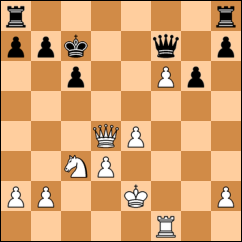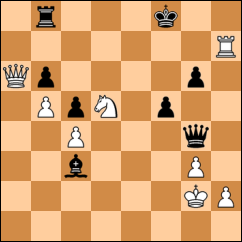Snatching mediocrity from the jaws of victory
The worst possible blunder you can make in chess is to resign in a winning position. Accepting a draw in a winning position is only half as bad, but it is still pretty disappointing, especially after working hard for hours. In the Boylston Chess Club's ongoing Paramount tournament, I've already managed to accomplish that dubious feat twice—and against the same player each time!

Against Ken Ho in the first round, I misplayed a tricky opening and he took advantage of it to win the exchange. As often happens at these levels, losing material freed me to just try to deploy my pieces actively while he hunkered down and tried to simplify at the expense of the initiative. After a little combination (which had a fatal flaw, but neither of us noticed it—welcome to chess at the 1700s level!), I had gained a pawn, put his king on the run, and had a couple of nasty passed pawns. A few checks back and forth to gain time on the clock and it was time decide whether to go for the win or accede to the perpetual.
All my attention was focused on pushing my passed pawns, but after moves like 27.e5 I just didn't see a way past Black's blockade, especially since his a8 rook was going to finally be able to enter the action. After using 8 of my 32 remaining minutes before move 40 to think about it, I played 27.Qe5+?? and Ken played 27...Kd7, repeating the position for the third time and claiming the draw.
But as club champion Chris Chase always says, “Check the checks!” 27.Nb5+! wins trivially. If 27...cxb5 28.Rc1+ Kb8 29.Qd6+ and mates; if 27...Kc8 28.Nd6+ picks up the queen; and if 27...Kb8 28.Qe5+ Kc8 29.Nd6+ gets the queen again. Why didn't I see it? I was tired; I was focused too much on the passed pawns; and the c-file had only just been half-opened so the idea that Rc1+ could happen didn't register. But with all of those things working against me, I still would have found it if I had just checked the checks.

Our rematch occurred a few weeks later (the Paramount is a double round robin). I acquired what I thought was a nice positional advantage, and when Ken sacked a pawn that was ultimately doomed anyway, I thought I would cruise to victory. But I exchanged the wrong set of minor pieces, and he ended up with a nasty outposted knight and open lines into my position. Seeing the chance for a perpetual check, I flung a few pieces forward, and it worked, as Ken saw through one perpetual check idea but not the other. Clearing the move-40 time control with minutes to spare, I accepted White's draw offer.
But Black is winning! After 41...Qe2+ 42.Kh3, 42...g5! threatens Qf1 mate, and White has no way out. It's a little tricky, especially since my own king is in some danger, and I think I didn't even really think about Qe2+ since my queen had come from e4 and it was natural to move it back there. It's also unintuitive to be able to mate with basically one piece. But I had tons of time, and worst, we were 10 minutes away from the game being adjourned, at which point I could have gone home and analyzed it at my leisure (and offered a draw over email if that didn't turn up anything). There was nothing to lose from letting my clock run down 10 minutes, since I had the draw in hand.
What is painful about both of these situations is that it was simply a process failure, not a failure of imagination or calculation. In the first game, I had 30 minutes left and a draw in hand, and just had to check the checks, as I should be doing every move of every game. In the second, I had nothing to lose from checking out the position at home instead of immediately accepting the draw.
I would say live and learn but apparently I didn't learn from the first game! Well, at least I didn't resign either game...